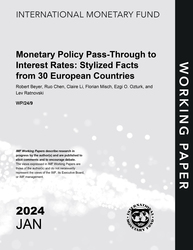
Monetary Policy Pass-Through to Interest Rates: Stylized Facts from 30 European Countries
Monetary Policy Pass-Through to Interest Rates: Stylized Facts from 30 European Countries
READ MORE...
Volume/Issue:
Volume 2024
Issue 009
Publication date: January 2024
ISBN: 9798400263613
$20.00
Add to Cart by clicking price of the language and format you'd like to purchase
Available Languages and Formats
| English |
Prices in red indicate formats that are not yet available but are forthcoming.
Topics covered in this book
This title contains information about the following subjects.
Click on a subject if you would like to see other titles with the same subjects.
Banks and Banking , Economics- Macroeconomics , Economics / General , Monetary Policy Transmission , Monetary Policy Pass-Through , NFC loan rate , pass-through to rate , transmission to output , Deposit rates , Central bank policy rate , Mortgages , Loans , Financial sector , Europe
Summary
The extent to which changes in monetary policy rates lead to changes in loan and deposit rates for households and firms, referred to as ‘pass-through’, is an important ingredient of monetary policy transmission to output and prices. Using data on seven different bank interest rates in 30 European countries, different approaches, and the full sample as well as a subsample of euro area countries, we show that a) the pass-through in the post-pandemic hiking cycle has been heterogenous across countries and types of interest rates; b) the pass-through has generally been weaker and slower, except for rates of non-financial corporation loans and time deposits in euro area countries; c) differences in pass-through over time and across countries for most deposit rates are correlated with financial sector concentration, liquidity, and loan opportunities, and d) the effects of pass-through to outstanding mortgage rates on monetary transmission on prices and output are heterogenous across countries.
Copyright © 2010 - 2026
Powered by:
AIDC



